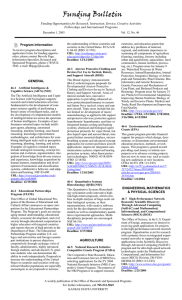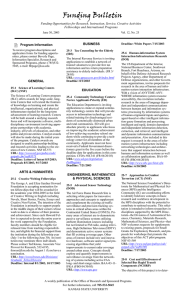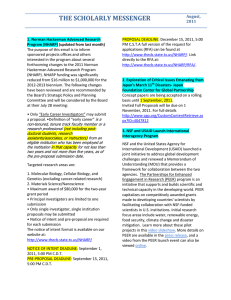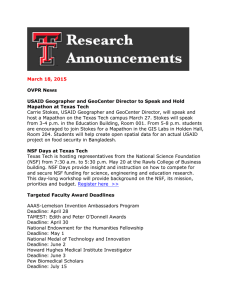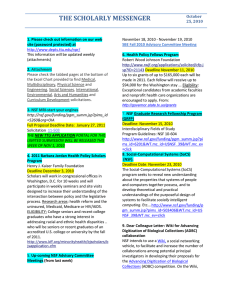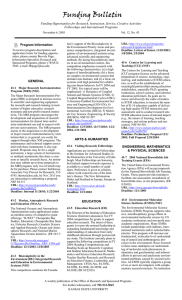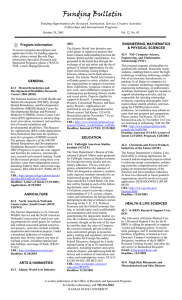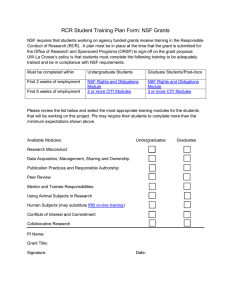Funding Opportunities for Research, Instruction, Service, Creative Activities
advertisement
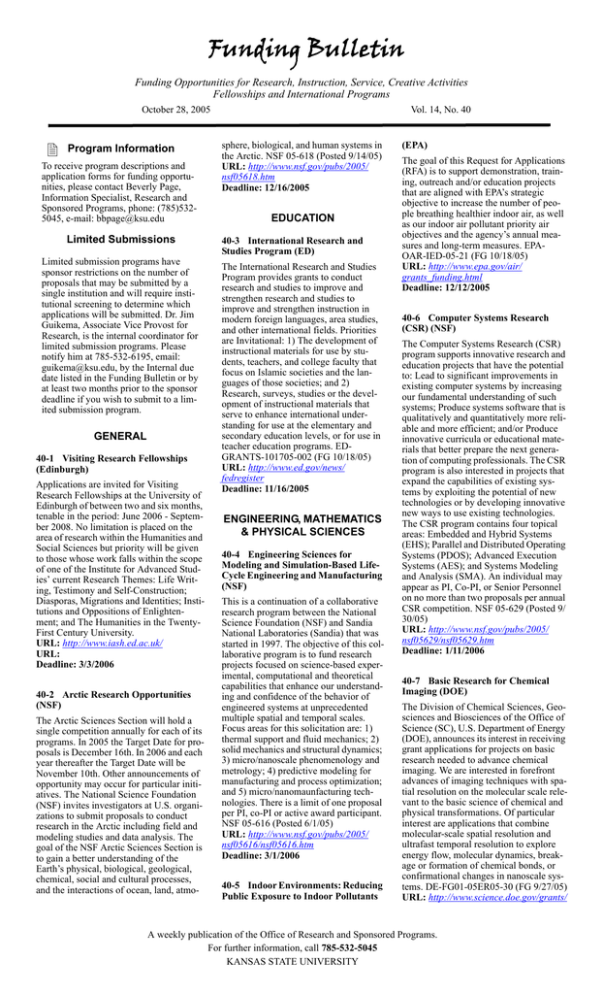
Funding Bulletin Funding Opportunities for Research, Instruction, Service, Creative Activities Fellowships and International Programs October 28, 2005 Program Information To receive program descriptions and application forms for funding opportunities, please contact Beverly Page, Information Specialist, Research and Sponsored Programs, phone: (785)5325045, e-mail: bbpage@ksu.edu Limited Submissions Limited submission programs have sponsor restrictions on the number of proposals that may be submitted by a single institution and will require institutional screening to determine which applications will be submitted. Dr. Jim Guikema, Associate Vice Provost for Research, is the internal coordinator for limited submission programs. Please notify him at 785-532-6195, email: guikema@ksu.edu, by the Internal due date listed in the Funding Bulletin or by at least two months prior to the sponsor deadline if you wish to submit to a limited submission program. GENERAL 40-1 Visiting Research Fellowships (Edinburgh) Applications are invited for Visiting Research Fellowships at the University of Edinburgh of between two and six months, tenable in the period: June 2006 - September 2008. No limitation is placed on the area of research within the Humanities and Social Sciences but priority will be given to those whose work falls within the scope of one of the Institute for Advanced Studies’ current Research Themes: Life Writing, Testimony and Self-Construction; Diasporas, Migrations and Identities; Institutions and Oppositions of Enlightenment; and The Humanities in the TwentyFirst Century University. URL: http://www.iash.ed.ac.uk/ URL: Deadline: 3/3/2006 40-2 Arctic Research Opportunities (NSF) The Arctic Sciences Section will hold a single competition annually for each of its programs. In 2005 the Target Date for proposals is December 16th. In 2006 and each year thereafter the Target Date will be November 10th. Other announcements of opportunity may occur for particular initiatives. The National Science Foundation (NSF) invites investigators at U.S. organizations to submit proposals to conduct research in the Arctic including field and modeling studies and data analysis. The goal of the NSF Arctic Sciences Section is to gain a better understanding of the Earth’s physical, biological, geological, chemical, social and cultural processes, and the interactions of ocean, land, atmo- Vol. 14, No. 40 sphere, biological, and human systems in the Arctic. NSF 05-618 (Posted 9/14/05) URL: http://www.nsf.gov/pubs/2005/ nsf05618.htm Deadline: 12/16/2005 EDUCATION 40-3 International Research and Studies Program (ED) The International Research and Studies Program provides grants to conduct research and studies to improve and strengthen research and studies to improve and strengthen instruction in modern foreign languages, area studies, and other international fields. Priorities are Invitational: 1) The development of instructional materials for use by students, teachers, and college faculty that focus on Islamic societies and the languages of those societies; and 2) Research, surveys, studies or the development of instructional materials that serve to enhance international understanding for use at the elementary and secondary education levels, or for use in teacher education programs. EDGRANTS-101705-002 (FG 10/18/05) URL: http://www.ed.gov/news/ fedregister Deadline: 11/16/2005 ENGINEERING, MATHEMATICS & PHYSICAL SCIENCES 40-4 Engineering Sciences for Modeling and Simulation-Based LifeCycle Engineering and Manufacturing (NSF) This is a continuation of a collaborative research program between the National Science Foundation (NSF) and Sandia National Laboratories (Sandia) that was started in 1997. The objective of this collaborative program is to fund research projects focused on science-based experimental, computational and theoretical capabilities that enhance our understanding and confidence of the behavior of engineered systems at unprecedented multiple spatial and temporal scales. Focus areas for this solicitation are: 1) thermal support and fluid mechanics; 2) solid mechanics and structural dynamics; 3) micro/nanoscale phenomenology and metrology; 4) predictive modeling for manufacturing and process optimization; and 5) micro/nanomaunfacturing technologies. There is a limit of one proposal per PI, co-PI or active award participant. NSF 05-616 (Posted 6/1/05) URL: http://www.nsf.gov/pubs/2005/ nsf05616/nsf05616.htm Deadline: 3/1/2006 40-5 Indoor Environments: Reducing Public Exposure to Indoor Pollutants (EPA) The goal of this Request for Applications (RFA) is to support demonstration, training, outreach and/or education projects that are aligned with EPA’s strategic objective to increase the number of people breathing healthier indoor air, as well as our indoor air pollutant priority air objectives and the agency’s annual measures and long-term measures. EPAOAR-IED-05-21 (FG 10/18/05) URL: http://www.epa.gov/air/ grants_funding.html Deadline: 12/12/2005 40-6 Computer Systems Research (CSR) (NSF) The Computer Systems Research (CSR) program supports innovative research and education projects that have the potential to: Lead to significant improvements in existing computer systems by increasing our fundamental understanding of such systems; Produce systems software that is qualitatively and quantitatively more reliable and more efficient; and/or Produce innovative curricula or educational materials that better prepare the next generation of computing professionals. The CSR program is also interested in projects that expand the capabilities of existing systems by exploiting the potential of new technologies or by developing innovative new ways to use existing technologies. The CSR program contains four topical areas: Embedded and Hybrid Systems (EHS); Parallel and Distributed Operating Systems (PDOS); Advanced Execution Systems (AES); and Systems Modeling and Analysis (SMA). An individual may appear as PI, Co-PI, or Senior Personnel on no more than two proposals per annual CSR competition. NSF 05-629 (Posted 9/ 30/05) URL: http://www.nsf.gov/pubs/2005/ nsf05629/nsf05629.htm Deadline: 1/11/2006 40-7 Basic Research for Chemical Imaging (DOE) The Division of Chemical Sciences, Geosciences and Biosciences of the Office of Science (SC), U.S. Department of Energy (DOE), announces its interest in receiving grant applications for projects on basic research needed to advance chemical imaging. We are interested in forefront advances of imaging techniques with spatial resolution on the molecular scale relevant to the basic science of chemical and physical transformations. Of particular interest are applications that combine molecular-scale spatial resolution and ultrafast temporal resolution to explore energy flow, molecular dynamics, breakage or formation of chemical bonds, or confirmational changes in nanoscale systems. DE-FG01-05ER05-30 (FG 9/27/05) URL: http://www.science.doe.gov/grants/ A weekly publication of the Office of Research and Sponsored Programs. For further information, call 785-532-5045 KANSAS STATE UNIVERSITY Tissues (NIH) FAPN05-30.html Deadline: 3/15/2005 40-8 Discovery Corps Fellowships (DCF) (NSF) The Discovery Corps Fellowship Program is a pilot program seeking new postdoctoral and professional development models that combine research expertise with service-oriented projects. Discovery Corps Fellows leverage their research expertise through projects that address areas of national need. Their projects enhance research capacity and infrastructure, contribute to workforce development and job creation and develop innovative linkages between chemistry and other fields. For this pilot program, successful Fellows will have research expertise in areas supported by the NSF Division of Chemistry. The Discovery Corps Fellowship Program compromises two categories of awards: recent doctoral recipients serve as Discovery Corps Postdoctoral Fellows; and mid-career professionals serve as Discovery Corps Senior Fellows. NSF 05-593 (Posted 6/27/05) URL: http://www.nsf.gov/pubs/2005/ nsf05593/nsf05593.htm Deadline: 12/2/2005 40-9 Information Exploitation Technology (DOD) The Defense Advanced Research Projects Agency seeks proposals to identify and develop new information technologies that bring revolutionary improvement to military operations and peacekeeping. DARPA is looking for ideas related to: sensing, signal processing, target characterization, data fusion, target tracking, predictive awareness, battle management, collaborative planning and visualization that can contribute to future conflict mitigation, war fighting and peacekeeping effectiveness. BAA05-45 URL: http://dtsn.darpa.mil/IXO/ solicitations/IXT/index.htm Deadline: 9/19/2006 HEALTH & LIFE SCIENCES 40-10 Proteomic Studies of Platelet Functions (NIH) The National Heart, Lung and Blood Institute (NHLBI) plans to support collaborative research on the application of proteomic tools to identify disorders of human platelet function. Support is intended for the adaptation and application of existing technology to study blood platelets and not for the development of new proteomic technology. We anticipate that such research will lead to more quantitative definitions of platelet disorders. RFA-HL-05-020 (NIHG 7/8/05) URL: http://grants.nih.gov/grants/guide/ rfa-files/RFA-HL-05-020.html Deadline: Letters of Intent 12/12/2005; Applications 1/12/2006 40-11 Biology of RNA Interference: Stability, Delivery and Processing by The purpose of this RFA is to stimulate research towards 1) understanding uptake and processing of RNA by target tissues; 2) assessing stability, half-life and off-target effects in target tissues; and 3) determining optimal delivery methods for uptake by the target tissues. RFA-HL-05019 (NIHG 8/5/05) URL: http://grants.nih.gov/grants/guide/ rfa-files/RFA-HL-05-019.html Deadline: Letters of Intent 12/21/2005; Applications 1/18/2005 SOCIAL SCIENCES 40-14 Social Science Research on Japan (NEH) The National Endowment for the Humanities and the Japan-U.S. Friendship Commission, invite applications for innovative social science research on the modern Japanese political economy, international relations and society and U.S.-Japan relations. URL: http://neh.gov/grants/grants.html Deadline: March 1 to May 1 Annually 40-12 AFAR Research Grants (AFAR) The major goal of this program is to assist in the development of the careers of junior investigators committed to pursuing careers in the field of aging research. A typical successful applicant will be serving in his or her first or second year of junior faculty appointment. AFAR funds research projects concerned with understanding the basic mechanisms of aging. Projects investigating age-related diseases are also supported, especially if approached from the point of view of how basic aging processes may lead to these outcomes. Projects concerning mechanisms underlying common geriatric functional disorders are also encouraged, as long as these include connections to fundamental problems in the biology of aging. Projects that deal strictly with clinical problems such as the diagnosis and treatment of disease, health outcomes, or the social context of aging are not eligible. URL: http://www.afar.org/afar99.html Deadline: 12/15/2005 SMALL BUSINESS 40-13 Small Business Innovation Research and Small Business Technology Transfer Programs Phase I (NSF) The SBIR/STTR Programs stimulate technological innovation in the private sector, by strengthening the role of small business concerns in meeting Federal research and development needs, increasing the commercial application of federally supported research results, and fostering and encouraging participation by socially and economically disadvantaged and women-owned small businesses. The significant difference between the SBIR and STTR programs is that STTR requires researchers at universities and other researchers institutions to play a significant intellectual role in the conduct of each STTR project. These university-based researchers, by joining forces with a small company, can spin-off their commercially promising ideas while they remain primarily employed at the research institution. Topics are: Biotechnology (BT), Chemical-based Technologies (CT), and Emerging Opportunities (EO). NSF 05-605 (Posted 8/4/05) URL: http://www.nsf.gov/pubs/2005/ nsf05605/nsf05605.htm Deadline: 12/8/2005 STUDENTS 40-15 East Asia and Pacific Summer Institutes for U.S. Graduate Students (EAPSI) (NSF) The East Asia and Pacific Summer Institutes (EAPSI) provide U.S. graduate students in science and engineering 1) firsthand research experience in Australia, China, Japan, Korea or Taiwan; 2) an introduction to the science and science policy infrastructure of the respective location; and 3) orientation to the society, culture and language. The primary goals of EAPSI are to introduce students to East Asia and Pacific science and engineering n the context of a research laboratory, and to initiate personal relationships that will better enable them to collaborate with foreign counterparts in the future. The institutes last approximately eight weeks from June to August. The National Institutes of Health (NIH) co-sponsor the Summer Institute in Japan. Applications are submitted directly by the individual graduate student, unlike standard NSF proposals that are submitted through the principal investigator’s U.S. authorized organizational representative. NSF 05-617 (Posted 9/8/05) URL: http://www.nsf.gov/pubs/2005/ nsf05617/nsf05617.htm Deadline: 12/13/2005 R.W. Trewyn, Vice Provost for Research & Dean of the Graduate School Jim Guikema, Associate Vice Provost, Graduate Research Caron Boyce, Administrative Specialist Preaward Section Paul Lowe, Director Anita Fahrny, Assistant Director Kathy Tilley, Carole Lovin, Rich Doan, Carmen Garcia, Dorothy Doan, Rex Goff, Dawn Caldwell, Leah Matteson Information Specialist & Editor Beverly Page Human Subjects, Animal Care & Use, and Biosafety Gerald P. Jaax, Research Compliance Officer Ashley Rhodes, Compliance Liaison Adassa Roe, Administrative Specialist Congressional Relations Sue Peterson, R.W. Trewyn A weekly publication of the Office of Research and Sponsored Programs. For further information, call 785-532-5045 KANSAS STATE UNIVERSITY
